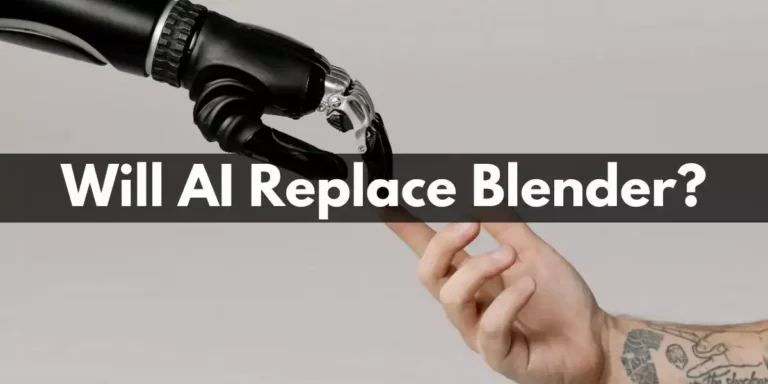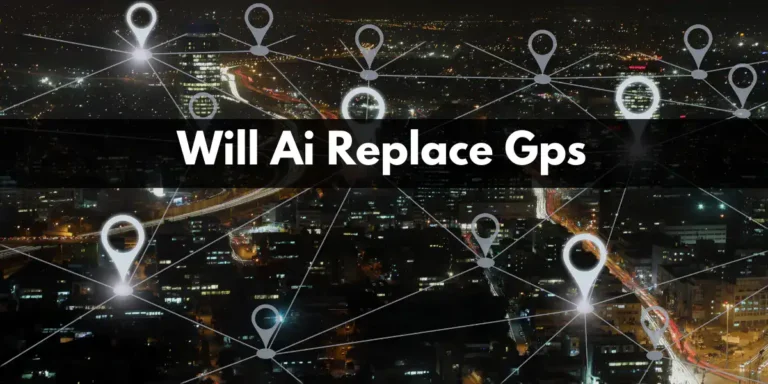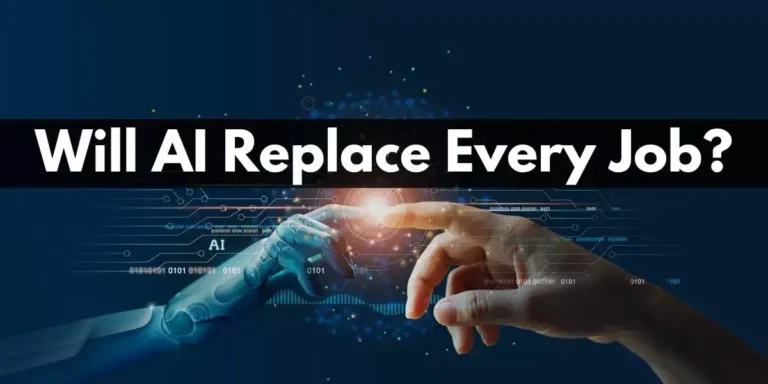While AI has already proven useful in diagnosing and treating a wide range of illnesses, some fear that it may ultimately replace physicians altogether.
In this blog post, we will explore the following:
- How Currently AI is being used in this sector
- The threat of AI on physicians’ roles in healthcare.
- Impact of AI on physicians Burnout and job satisfaction
- Recommended training and education for physicians to use AI optimally
- Ethical consideration of using AI in the healthcare sector.
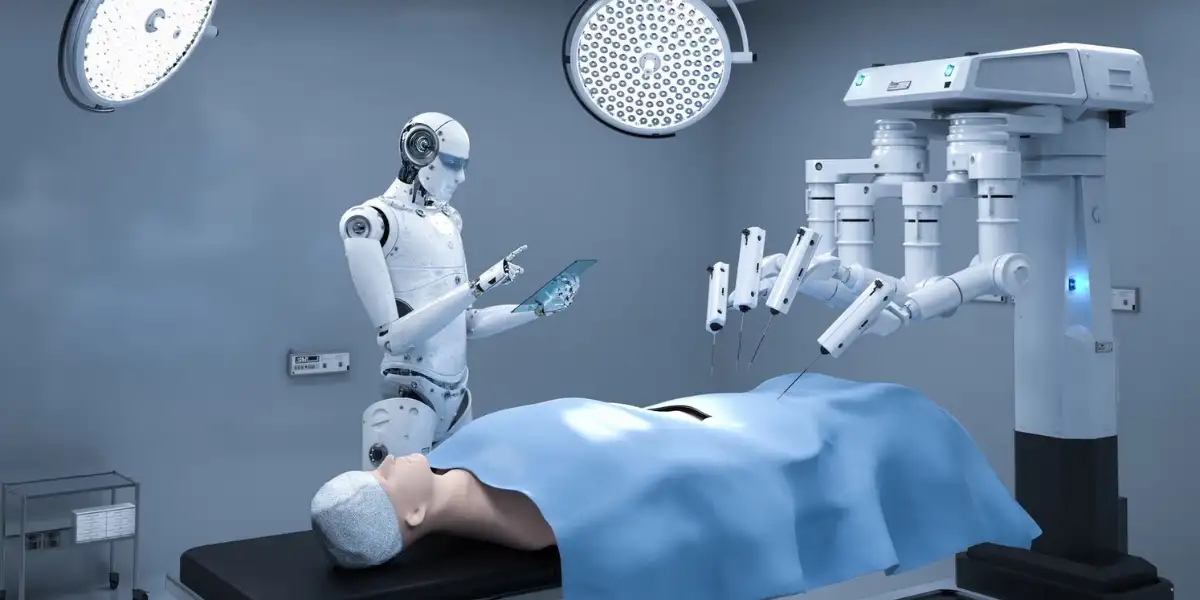
Will AI Replace Physicians?
No, AI won’t replace doctors, but it will become an essential tool for early disease diagnosis.
Physicians who don’t use AI might be replaced, and those who do won’t necessarily profit from it.
The healthcare organization might not get monetary rewards either, as the US medical care system operates on a fee-for-service model.
How AI Is Currently Being Used In Healthcare And Medicine
AI-powered predictive care:
Healthcare professionals can deliver proactive, tailored care that considers a patient’s unique requirements and risk factors by utilizing AI and predictive analytics to get insights into the elements that affect our health.
With the use of this technology, medical personnel can identify potential health problems before they arise, allowing for early intervention and perhaps even averting the issue altogether.
Health care analytics:
Historical data is used to train AI and machine learning algorithms to generate insights, enhance decision-making, and improve health outcomes.
Healthcare providers can diagnose and treat illnesses more correctly and effectively by using these analytics to find patterns and trends that might not be visible to the naked eye.
Precision medicine:
Healthcare professionals can create individualized treatment plans for patients that take into account variables like genetics, lifestyle, and environment by utilizing AI to evaluate massive datasets.
This may result in better treatments that are adapted to each patient’s particular need.
Predictive analytics:
A type of data analysis called predictive analytics makes predictions about the future using statistical models and machine learning techniques.
Healthcare practitioners can intervene before these issues worsen by using predictive analytics to identify patients who are at risk of developing specific conditions or consequences.
Medical imaging:
AI is being used to examine medical pictures, including X-rays, MRIs, and CT scans, allowing medical professionals to identify and treat patients more quickly and accurately.
Huge volumes of visual data can be analyzed by AI algorithms, which can spot patterns that may not be visible to the human eye and could result in earlier and more precise diagnoses.
Electronic health records (EHRs):
Electronic health records are being analyzed using AI to look for patterns and trends that could help with patient diagnosis and treatment.
Healthcare practitioners can create more effective treatment plans by analyzing vast volumes of data from EHRs to find potential contributing variables to a patient’s illness.
Administration and clinical decision support:
AI is being used to streamline administrative tasks such as scheduling and billing, freeing up healthcare providers to spend more time with patients.
Additionally, AI-powered clinical decision support tools can help healthcare providers make more informed treatment decisions by analyzing patient data and recommending the most effective treatments.
The potential threat of AI to a doctor’s essential role in healthcare
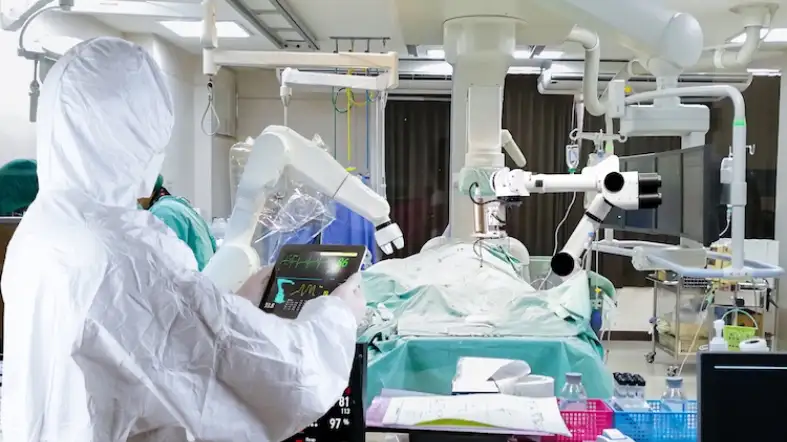
AI may prioritize efficiency over patient care
While efficiency is important in healthcare, AI may prioritize it at the expense of personalized patient care.
AI algorithms may focus on optimizing treatment plans based solely on data, without taking into account the unique needs and preferences of each patient.
AI may lead to a loss of medical expertise.
There is a risk that physicians will become overly dependent on AI as technology plays a larger role in healthcare decision-making and lose their capacity to practice medicine.
This could result in a situation where doctors require AI to help them develop correct diagnoses or treatment strategies.
Loss of trust
Patients may start to lose trust in doctors if they feel that AI is making all the important decisions.
Patients rely on doctors to explain their diagnosis and treatment options, and to provide guidance and support.
If AI takes over these essential roles, patients may feel like they are being treated like just another data point.
Lack of empathy
Doctors possess a level of empathy and emotional intelligence that AI simply cannot replicate.
Empathy is critical in healthcare, particularly when patients are dealing with severe illnesses.
The human touch that doctors provide cannot be replaced by machines, and without this crucial element, patients may feel isolated and disconnected from their healthcare providers.
Misdiagnosis
Although the ability of AI to evaluate enormous volumes of data is impressive, it is not perfect.
AI has occasionally misidentified patients, which has resulted in ineffective therapies or delays in diagnoses.
On the other hand, medical experts can alter their strategy if they have the knowledge and experience to spot a problem.
Depersonalization of healthcare
AI has the potential to depersonalize healthcare, turning it into a series of clinical interactions devoid of emotion or connection.
Doctors provide a personal touch that makes patients feel seen, heard, and cared for.
Losing that touch can lead to feelings of loneliness, anxiety, and depression in patients.
The Potential Impact Of AI On Physician Burnout And Job Satisfaction
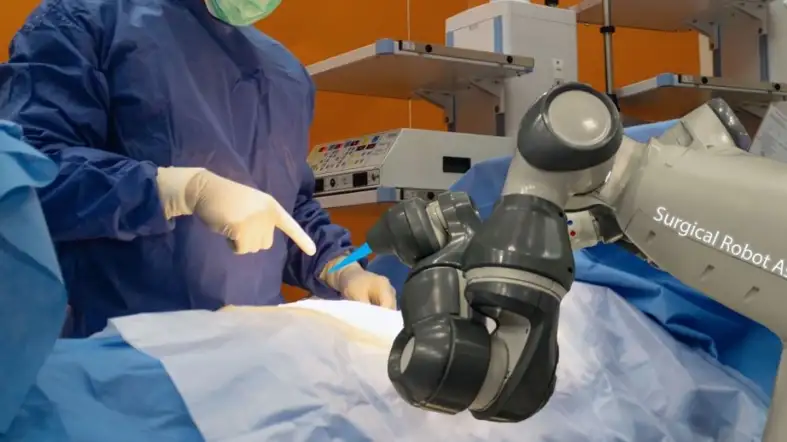
The Problem of Physician Burnout
Physician burnout is a growing problem in healthcare, with more than half of health workers reporting burnout during the COVID-19 pandemic.
Burnout can manifest in several ways, including emotional exhaustion, depersonalization, and a reduced sense of personal accomplishment.
Burnout can lead to decreased productivity, decreased job satisfaction, and increased medical errors.
Explore the Potential of AI in Addressing Physician Burnout
AI has the potential to help address the problem of physician burnout by reducing administrative tasks and freeing up more time for physicians to focus on direct patient care.
Studies show that AI can help improve patient outcomes and satisfaction, reduce healthcare costs, and improve physician well-being.
AI can also help physicians make more informed decisions by providing them with real-time data and insights.
Review Relevant Studies and Reports
Several studies and reports have explored the potential impact of AI on physician burnout and job satisfaction.
For example, a study published in Mayo Clinic Proceedings demonstrated that AI could help reduce burnout by automating administrative tasks and reducing the workload on physicians.
Different research from McKinsey & Company gives a thorough assessment of the current state of AI in healthcare and how it can change the sector.
Learn About AI Solutions
There are several AI solutions available that can help address physician burnout and improve job satisfaction.
Microsoft Cloud for Healthcare, for example, is a platform that leverages AI to reduce administrative burdens, enhance patient engagement, and improve clinical outcomes.
Other AI solutions include chatbots, voice recognition software, and predictive analytics tools.
Consider the Benefits of AI for Bengali Physicians
The potential benefits of AI for Bengali physicians are significant.
By leveraging AI solutions, Bengali physicians can reduce their administrative workload and focus more on direct patient care.
This can lead to improved patient outcomes, increased job satisfaction, and decreased burnout.
The need for physicians to have training and education on how to use AI in healthcare effectively

Importance of Digital Health:
Although digital health has led to significant changes in medicine, it has yet to be fully integrated into teaching and learning in the medical education continuum.
This is especially important as AI becomes increasingly prevalent in healthcare.
Be Optimistic about Clinical AI:
The most upbeat doctors are those who believe clinical AI will enhance training in research, audit, and quality improvement.
These are important educational requirements that can be difficult to meet without a sizable time and effort investment outside of employment.
Perceive the Impact on Clinical Skills:
Trainees perceive that clinical AI could reduce their training in practical skills, clinical judgment, and decision-making.
These abilities need time, a variety of clinical experiences, personal reflection, iterative practice, and the development of heuristics.
Recognize the Impact on Interpersonal and Ethical Skills:
Both positive and negative impression themes included the impact on interpersonal and ethical skill development.
Doctors envision that AI will automate tasks, freeing up more time to develop communication skills.
Trainees are optimistic that this will enhance their ability to provide patient-centered care.
Conversely, doctors express concern that AI will reduce their empathy for patients and that patients will lose the human touch.
Identify Specialties with Higher Proportions of AI Optimistic Trainees:
There was a higher percentage of ‘AI positive’ trainees in the medical, surgical, and community-based (General Practice, Psychiatry) disciplines.
This may be due to lower clinical acuity in these specialties and higher administrative workload.
Trainees in these specialties may perceive that AI will improve their workflow to free up time for training and education.
Develop Curriculum Proposals:
Numerous authors in the literature emphasize that a fundamental and mandated change in education is necessary if current medical education is to satisfy AI’s needs.
Making curriculum suggestions specifically created to teach aspiring doctors about AI would be a significant contribution in that direction.
Take Direct Routes to Leverage AI Technology:
As clinical practice changes, clinical education must change as well. Utilizing AI technology, direct routes enhance the delivery of instruction
This includes developing AI-powered modules, using virtual reality simulators, and integrating AI into the clinical curriculum.
The Ethical Considerations Of Using AI In Medical Diagnosis And Treatment
Privacy and Surveillance:
The possible invasion of patient privacy is one ethical concern with AI in medical diagnosis and treatment.
Sensitive data may be leaked or misused as AI gathers and analyzes enormous amounts of patient data.
Because of this, it’s crucial to make sure AI systems abide by ethical norms and privacy laws and that patients are aware of their rights to control their personal information.
Bias or Discrimination:
Another ethical consideration is the risk of AI systems perpetuating bias and discrimination in medical diagnosis and treatment.
AI algorithms can reflect the biases of their creators and the data they are trained on, leading to inaccurate or unfair outcomes.
Therefore, it is crucial to ensure that AI systems are designed to be unbiased and that their decisions are transparent and explainable.
Role of Human Judgment:
Another ethical issue to take into account when employing AI for medical diagnosis and treatment is the role of human judgment.
The human knowledge and intuition required for making complicated medical judgments cannot be replaced by AI, despite the latter’s ability to handle enormous volumes of data swiftly.
As a result, AI should be employed to assist healthcare workers rather than to take their place.
Inaccuracy and Data Breaches:
Concerns concerning the technology’s accuracy and the possibility of data breaches are raised by the use of AI in medical diagnosis and treatment.
Data breaches can jeopardize patient confidentiality and privacy, and AI systems are subject to errors that might result in inaccurate diagnoses and treatments.
As a result, the security and accuracy of AI systems must be continually assessed, and steps must be taken to prevent data leaks.
FAQs
Will AI Lead To A Shortage Of Doctors?
While some estimate that technology could replace up to 80% of what doctors currently do, there will still be a need for competent medical professionals to operate and oversee the technology.
Additionally, the aging population and increasing demand for healthcare services may actually lead to a shortage of doctors in the future.
Can AI Be Used To Diagnose Mental Health Conditions?
Speech and behavior patterns can be used to infer the presence of mental health problems like melancholy and anxiety, and there is evidence to back up this claim.
The identification of mental health issues necessitates a thorough understanding of a patient’s medical history in addition to other variables that AI might not be able to fully account for.
Will AI Lead To More Personalized Healthcare?
Artificial intelligence (AI) has the capacity to examine vast volumes of data and offer patients individualized advice and treatment strategies based on their unique medical histories and genetic make-up.
Conclusion
While AI is revolutionizing medicine, it won’t replace doctors anytime soon.
AI can help diagnose and treat certain ailments, but it lacks empathy, intuition, and nuanced decision-making.
The optimal strategy is likely to combine AI and human expertise, with doctors and other healthcare professionals partnering with AI systems to give patients the greatest treatment.
